英语选修7外研版Module 4 Section Ⅳ Grammar & Writing课件
文档属性
| 名称 | 英语选修7外研版Module 4 Section Ⅳ Grammar & Writing课件 | 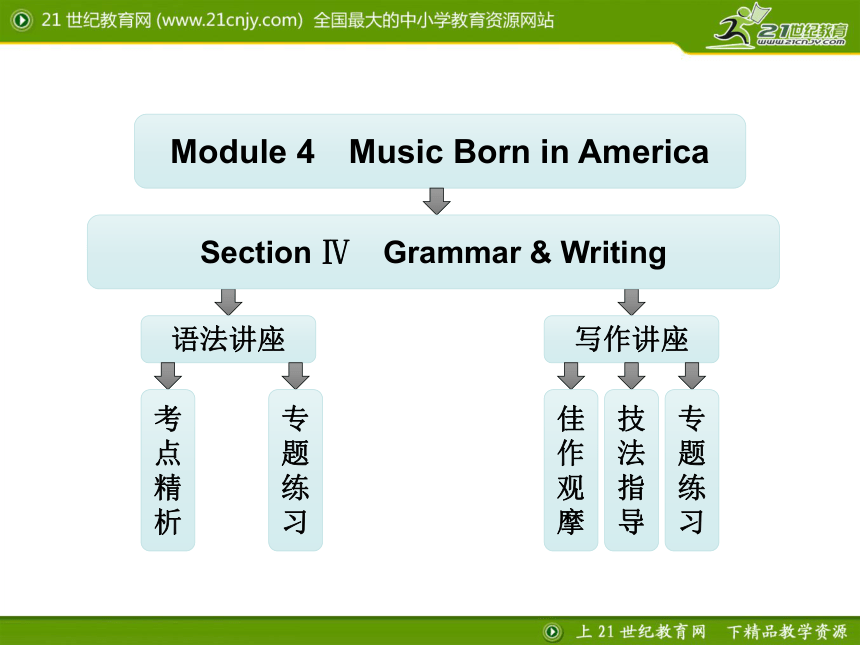 | |
| 格式 | zip | ||
| 文件大小 | 556.0KB | ||
| 资源类型 | 教案 | ||
| 版本资源 | 外研版 | ||
| 科目 | 英语 | ||
| 更新时间 | 2013-01-20 11:58:23 | ||
图片预览

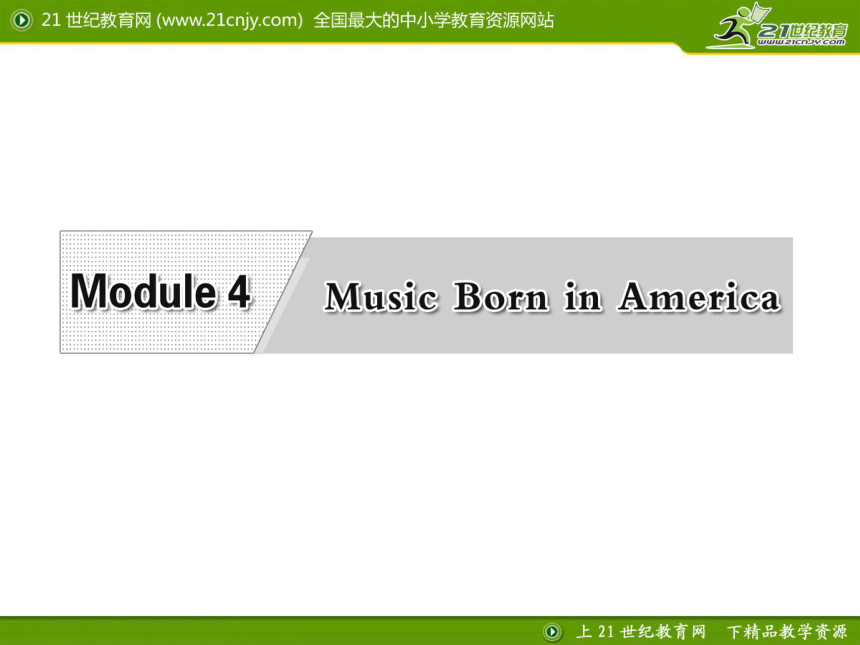
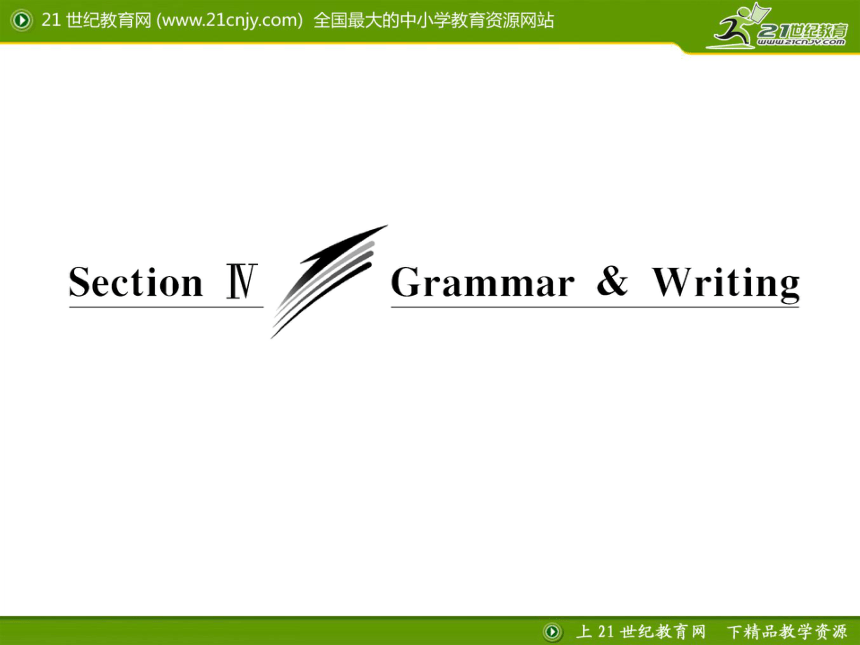
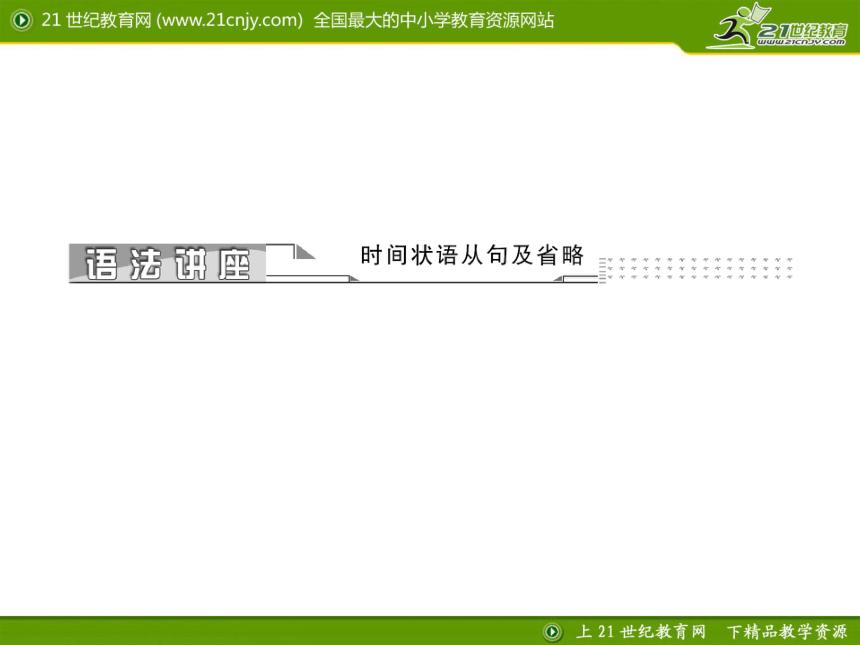
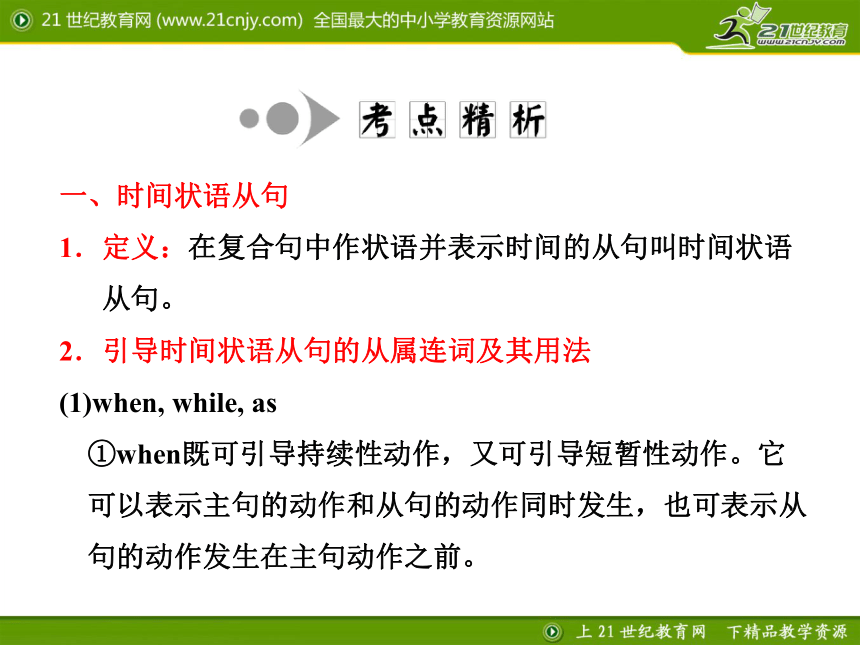
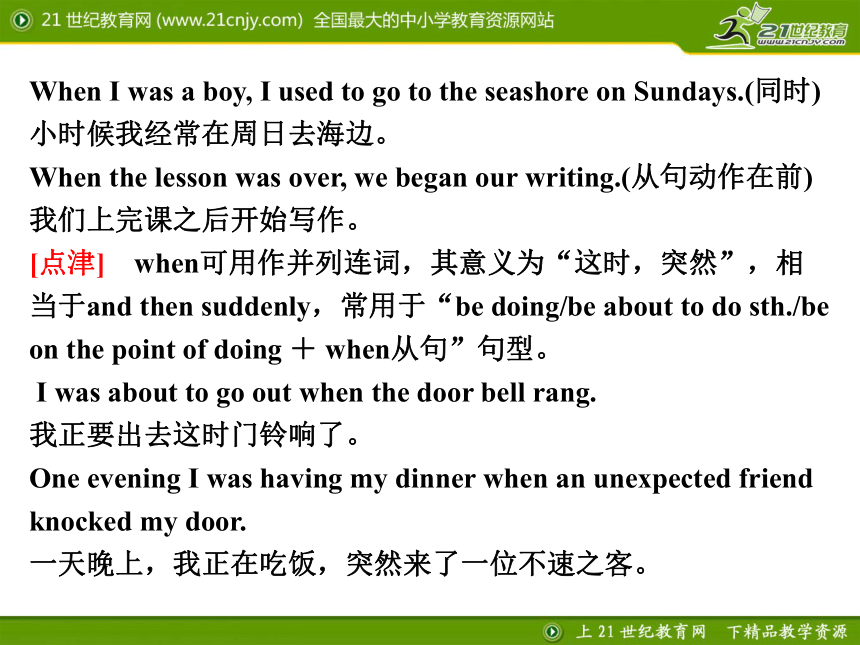
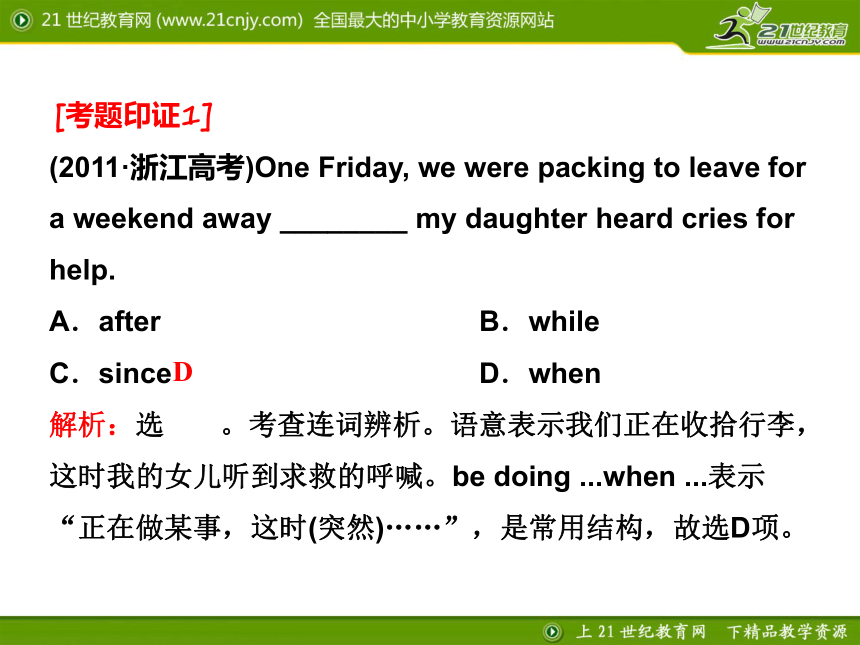
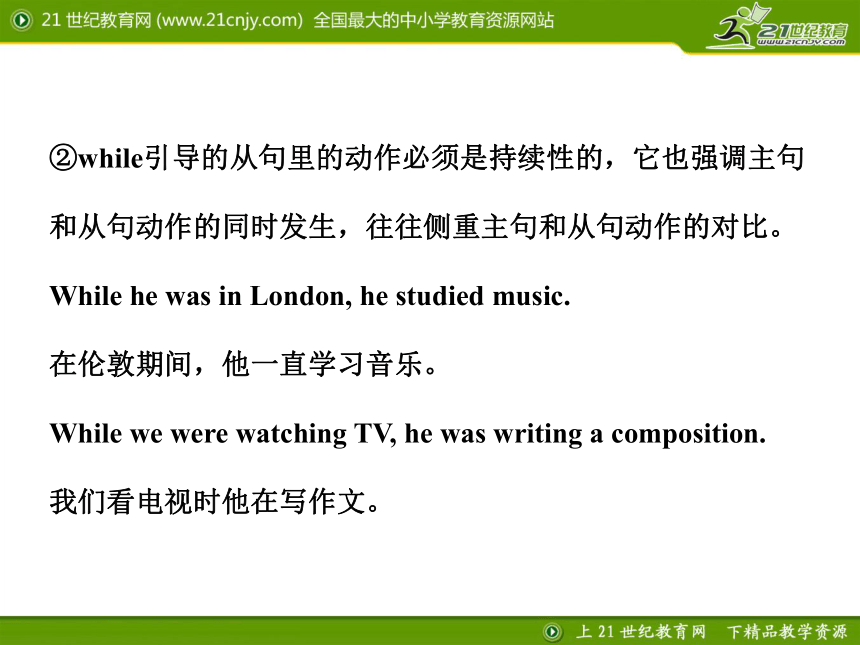


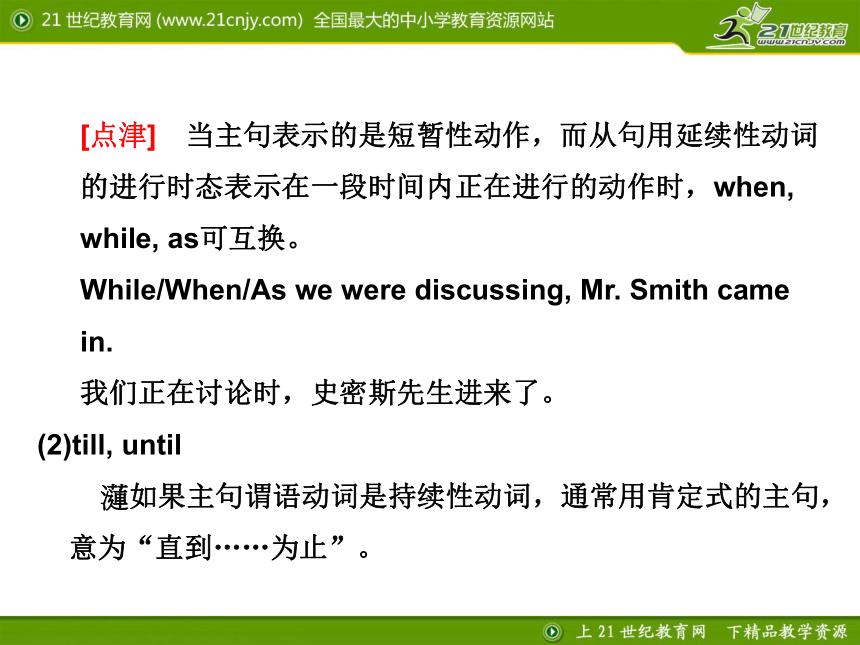
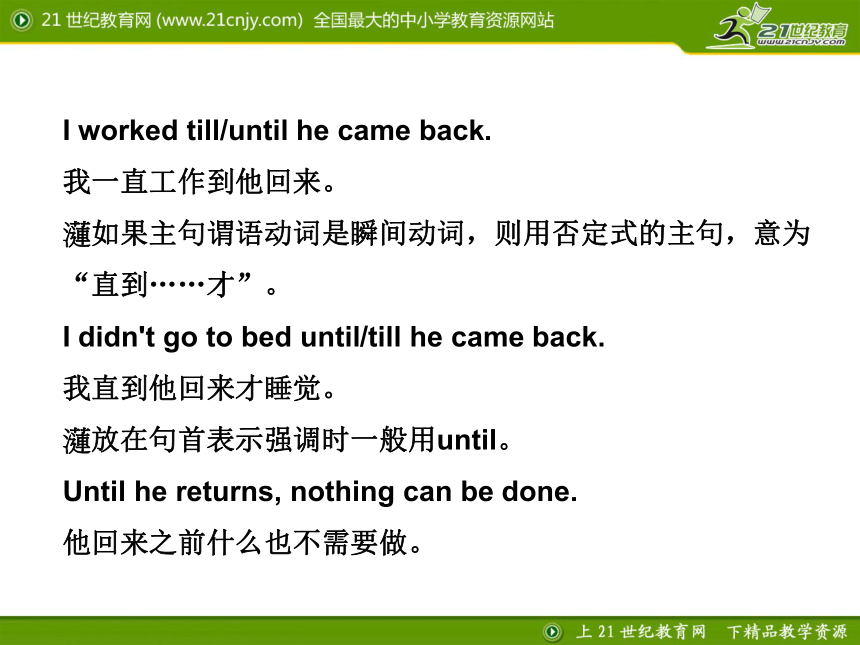
文档简介
课件48张PPT。语法讲座写作讲座考点精析专题练习佳作观摩技法指导专题练习Module 4 Music Born in AmericaSection Ⅳ Grammar & Writing一、时间状语从句
1.定义:在复合句中作状语并表示时间的从句叫时间状语
从句。
2.引导时间状语从句的从属连词及其用法
(1)when, while, as
①when既可引导持续性动作,又可引导短暂性动作。它
可以表示主句的动作和从句的动作同时发生,也可表示从
句的动作发生在主句动作之前。When I was a boy, I used to go to the seashore on Sundays.(同时)
小时候我经常在周日去海边。
When the lesson was over, we began our writing.(从句动作在前)
我们上完课之后开始写作。
[点津] when可用作并列连词,其意义为“这时,突然”,相当于and then suddenly,常用于“be doing/be about to do sth./be on the point of doing + when从句”句型。
I was about to go out when the door bell rang.
我正要出去这时门铃响了。
One evening I was having my dinner when an unexpected friend knocked my door.
一天晚上,我正在吃饭,突然来了一位不速之客。[考题印证1](2011·浙江高考)One Friday, we were packing to leave for a weekend away ________ my daughter heard cries for help.
A.after B.while
C.since D.when
解析:选 。考查连词辨析。语意表示我们正在收拾行李,这时我的女儿听到求救的呼喊。be doing ...when ...表示“正在做某事,这时(突然)……”,是常用结构,故选D项。D②while引导的从句里的动作必须是持续性的,它也强调主句和从句动作的同时发生,往往侧重主句和从句动作的对比。
While he was in London, he studied music.
在伦敦期间,他一直学习音乐。
While we were watching TV, he was writing a composition.
我们看电视时他在写作文。③as引导持续性动作,表示主句和从句的动作同时发生或交替进行。
He hurried home, looking behind as he went.
他急匆匆地回家,边走边回头看。
As you grow older, you will know better and better about yourself.
随着年龄的增长,你会越来越了解自己。[考题印证2](2012·山东高考) He smiled politely ________ Mary apologized for her drunken friends.
A.as B.if
C.unless D.though
解析:选 。考查状语从句。句意:当Mary为她喝醉了的朋友道歉时,他礼貌地微笑着。根据句意,此处只能用as引导时间状语从句。if“如果”;unless“除非”;though“虽然”。A[点津] 当主句表示的是短暂性动作,而从句用延续性动词的进行时态表示在一段时间内正在进行的动作时,when, while, as可互换。
While/When/As we were discussing, Mr. Smith came in.
我们正在讨论时,史密斯先生进来了。
(2)till, until
?如果主句谓语动词是持续性动词,通常用肯定式的主句,
意为“直到……为止”。 I worked till/until he came back.
我一直工作到他回来。
?如果主句谓语动词是瞬间动词,则用否定式的主句,意为
“直到……才”。
I didn't go to bed until/till he came back.
我直到他回来才睡觉。
?放在句首表示强调时一般用until。
Until he returns, nothing can be done.
他回来之前什么也不需要做。(2011·上海高考)If a lot of people say a film is not good, I won't bother to see it, or I'll wait ________ it comes out on DVD.
A.whether B.after
C.though D.until
解析:选 。考查状语从句。句意:如果众人都说一部电影不好,我会懒得去看,或者会等到DVD出来再看。Until
“直到……为止”。D[考题印证3](3)before, after
①before
?意为“在……之前”,置于主句前后均可。
Before the sun sets, we must go home.
太阳落山前,我们必须回家。
?如果before引导的从句位于主句之后,有时不能译成
“在 ……之前”,而要译成“过了多久才……”“还未……
就”等。The struggle lasted four years before the North won in the end.
斗争持续了4年北方才最终获胜。
He almost knocked me down before he saw me.
他几乎撞到我时才看见我。
She left before I could have a word with her.
我还没来得及和她说句话,她就离开了。?常用句型:
·It will be +时间段+before ...(从句用一般现在时)
要过……时间才……
·It won't be long before ...(从句用一般现在时)不久就会……
·It was not long before ...(从句用一般过去时)没过多久就……
·It was +时间段+ before ...(从句用一般过去时)
过了……时间才……
It will be two years before he leaves the country.
再过两年他才会离开这个国家。
It was two years before he left the country.
过了两年他才离开这个国家。[考题印证4](2010·陕西高考)John thinks it won't be long ________ he is ready for his new job.
A.when B.after
C.before D.since
解析:选 。此题考查连词。it won‘t be long before...意为“不久就……”。句意:约翰认为他不久就会为新工作做好准备了。C②after
意为“在……之后”, 置于主句前后均可。
After he graduated, he went to Beijing to look for a job.
他毕业之后就去北京找工作了。
(4)immediately, instantly, the moment, the instant, the minute
引导时间状语从句,相当于as soon as,意为“一……就……”。
The moment he arrived at Shanghai, he went to see his uncle.
他一到上海就去看望他叔叔了。(5)hardly ... when, scarcely ... when, no sooner ... than 引导
时间状语时相当于as soon as,主句使用过去完成时,从
句使用一般过去时。如果hardly, no sooner, scarcely置于
句首,句子必须用部分倒装结构。
Hardly had I got home when it began to rain.
我刚一回家,天就开始下雨了。[考题印证5](2011·辽宁高考)He had no sooner finished his speech ______
the students started cheering.
A.since B.as
C.when D.than
解析:选 。考查固定句型。no sooner ...than...“一……就……”为固定句型,故D项正确。hardly...when...也表示“一……就……”。D(6)by the time (到……为止), each/every time (每次), the first
time (第一次), the last time (最后一次), next time (下次)都可
以作为连词引导时间状语从句。
By the time he was fourteen, he had taught himself advanced
mathematics.
到他14岁的时候,他早已自学了高等数学。
Each time he came to Jinan, he would call on me.
每次他来济南都会来找我。
Next time you come, please bring your son.
下次来时,带你儿子来。(7)since
?since意为“自从”时,所引导的从句使用非延续性动词,
主句使用完成时态。
Since he graduated from college, he has worked in this
city.
大学毕业后,他便在这个城市工作。
?若since所引导的从句使用延续性动词或状态动词的过去
式,则表示动作或状态的完成或结束。
Since he lived in Nanjing, I have not heard from him.
自从他不在南京居住后,我就没有收到过他的信。?常用句型:
·It is/has been + 时间段+ since ...(从句用一般过去时)
·It was + 时间段+ since ...(从句用过去完成时)
It is five days since he came here.
他来这儿5天了。
It is five days since he was here.
他离开这儿5天了。
[点津] 从句用短暂性动词表示动作持续了多久,用延续性动词表示动作停止了多久。[考题印证6](2012·四川高考)As is reported, it is 100 years______Qinghua University was founded.
A.when B.before
C.after D.since
解析:选 。考查状语从句。since conj. “自……以来,从……以后”,引导时间状语从句。句意:据报道,自清华大学建立以来已有一百年了。It is +一段时间+ since从句表示“自从……以来已有多长时间了”。D二、省略
省略是英语的一种习惯用法。句子的成分有时出于修辞上的需要,在句中并不出现,但句子仍能表达完整的意义,这种句子叫做省略句,这种语法现象称为“省略”。
1.简单句中的省略
(1)在简单句中常省略主语、谓语或谓语的一部分、宾语、
表语,有时同时省略几个成分。(Have you) Found the bike?
你找到自行车了吗?
— (Are you) Hungry?
你饿了吗?
— Yes, I am (hungry).
是的,我饿了。(2)动词不定式中的省略
①保留不定式符号to,省略动词。
有些动词如want, wish, hope, like, live, try, forget, prefer,
mean, expect, be going, be about, be sure, be certain, be
likely, be ready, be supposed, be obliged, be bound等的后
面,为避免重复,只用不定式符号to表示不定式。
— Would you like to come to the party?
你要去参加晚会吗?
— Yes, I'd like to.
是的,我想去。[点津] 如果该宾语是be动词或完成时态,则须在to之后加上be或have。
— Are you an engineer?
你是一个工程师吗?
— No, but I want to be.
不,但我想当。
— He hasn't finished the task yet.
他还没有完成任务。
— Well, he ought to have.
哦,他应当完成的。②动词believe, find, think, feel, consider, imagine等后面作宾补的结构to be+n./adj.中的to be可省略。
His mother found him (to be) a clever boy.
他母亲发现他是一个聪明的孩子。
③感官动词see, hear, feel, watch, notice等以及使役动词let, make, have后作宾补的动词不定式中的不定式符号to要省略,但变为被动语态时,to必须保留。They made the boy go to bed early.
他们让这个男孩早睡。
The boy was made to go to bed early.
这个男孩被迫早睡。
④but作“除……之外”解时,其前有实义动词do时,but后的不定式须省去to。
We have nothing to do now but wait.
我们现在除了等没有别的事可做。
He has no choice but to accept the fact.
除了接受这个事实,他别无选择。⑤在并列结构中为了避免重复,可省去后面的不定式符号to。
It is impossible to laugh and (to) cry at the same time.
同时又哭又笑是不可能的。
2.并列句中的省略
并列句中后面分句与前面分句相同的部分都可以省略。
Bob has done his homework, but Tom hasn't (done his homework).
鲍勃已经做了家庭作业,但是汤姆却没有。3.复合句中的省略
(1)主句中的省略
常见于句首或回答问题时,只用从句。
— Did you know anything about it before?
这件事你以前知道吗?
— (I did) Not (know) until you told me.
直到你告诉了我,我才知道。(2)从句中的省略
①主句与从句谓语相同时,可以省略从句中的相同部分。
She didn't attend the concert, but I wonder why (she didn't
attend the concert).
她没参加音乐会,但我想知道为什么(她没参加音乐会)。
②状语从句
?在时间、地点、条件、方式或让步状语从句中,如果主
句与从句的主语一致,从句中谓语动词又包含be或从句主
语是it,可以把从句的主语和be省略。
Unless (it is) necessary, you'd better not refer to the dictionary.
如果没有必要,你最好不要查字典。[考题印证7]7-1.(2012·山东高考)When you are done with the book, just
give it to Lucy or Helen or ________.
A.whoever B.wherever
C.whatever D.however
解析:选 。考查词义辨析。句意:你看完书后,把书
给Lucy或Helen,或谁都行。whoever在这里作代词,意
为“不管什么人;无论是谁”,符合题意。A7-2.(2012·江苏高考)It sounds like something is wrong with
the car's engine.______, we'd better take it to the garage
immediately.
A.Otherwise B.If not
C.But for that D.If so
解析:选 。考查省略和替代。从句意可知,此处表示
对可能发生的事件的假设,因此选择if so“如果这样的
话”,so代替前面句子中提到的情况。D?在由than, as引导的比较状语从句中,在不造成误解的前提下,成分可省略。
I know you can do better than he (can do).
我知道你能比他做得更好。
The exhibition is a great success as (it was) expected.
正如我们预料的那样,这次展览很成功。(3)主句与从句连接词的省略
①在宾语从句中that可省略,但如果有两个或两个以上的
宾语从句时,除第一个that外,其他that不能省略。
He said (that) he had arrived here two days before and that
he had lived in a hotel.
他说他两天前到的这儿,住在了一家旅馆。
②在定语从句中作宾语的that, which或whom可以省略。
The book (that) he bought yesterday was expensive.
他昨天买的书很贵。(4)虚拟语气中的省略
①should在虚拟语气中通常可以省略。
He accepted the suggestion that he (should) go there by train.
他接受了那个他应该坐火车去那里的建议。
②在虚拟语气中,常省掉if,从句使用倒装句式。
Had you followed the doctor's advice, you would be better now.
如果你听从了医生的建议,你现在就会好多了。
Should it rain tomorrow, we would have to put off the visit
till next week.
如果明天下雨,我们不得不把访问推迟到下周。 [考题印证8](2010·浙江高考)Had I known about this computer program, a huge amount of time and energy ________.
A.would have been saved
B.had been saved
C.will be saved
D.was saved
解析:选 。考查虚拟语气。从前面had I known about ...知,此处是if条件句对过去情况的虚拟,所以主句用should/would/
could/might+have done结构,故排除B、C、D项,选A项。A点击下列图片进入 假定你是李华,最近你班就“中学生听MP3”的现象进行了一次讨论,请你将以下讨论结果写信给某英文报社,客观反映情况。词数120左右。Dear Editor,
①Recently, our class had a discussion about whether middle school students should listen to MP3 player.
②40% of them agree with the idea, saying that as a middle school student, it is fashionable to do so. ③Besides, you can relax while listening to music. ④ Thirdly, with the help of an MP3 player, we can improve our English listening ability. ⑤Others, however, hold the opposite idea. ⑥Firstly, it has a bad effect onour studies as it takes time. ⑦What's more, listening too much does harm to the hearing. ⑧Thirdly, it is a waste of money to buy an MP3 player.
⑨In my opinion, we should make good use of an MP3 player and limit the time for listening if we do want to use it.第一段:引出讨论的话题;
第二段:就中学生听MP3的利弊进行正反论述;
第三段:发表自己的看法。②句使用了现在分词作状语结构;③句使用了省略结构;
⑦句使用了现在分词作主语;⑧句使用了it is +adj./n.+
to do sth.句型。
③④⑥⑦⑧句使用了连接词besides, thirdly, firstly, what's more,使文章层次分明、脉络清晰。
⑥⑧⑨句中短语的使用给文章增添了色彩。 一个好的学习习惯的形成往往是由不足到逐渐完善的发展过程。此类文章一般分为两段,第一段叙述自己在学习中存在的种种不足,以及由此带来的不良后果;第二段记叙通过老师或者同学的帮助,自己改进了学习方法并取得很大进步。[黄金表达]1.With the help of ..., I came to realize that ...
2.In the past, I thought ...
3.I didn't like to read or speak ...
4.From then on, I practised reading loud.
5.He told me I should learn ...by heart.
6.I've become more and more interested in ...
7.As a result, I've made rapid progress in ... and become
more confident.
8.the+比较级 ... the+比较级点击下列图片进入
1.定义:在复合句中作状语并表示时间的从句叫时间状语
从句。
2.引导时间状语从句的从属连词及其用法
(1)when, while, as
①when既可引导持续性动作,又可引导短暂性动作。它
可以表示主句的动作和从句的动作同时发生,也可表示从
句的动作发生在主句动作之前。When I was a boy, I used to go to the seashore on Sundays.(同时)
小时候我经常在周日去海边。
When the lesson was over, we began our writing.(从句动作在前)
我们上完课之后开始写作。
[点津] when可用作并列连词,其意义为“这时,突然”,相当于and then suddenly,常用于“be doing/be about to do sth./be on the point of doing + when从句”句型。
I was about to go out when the door bell rang.
我正要出去这时门铃响了。
One evening I was having my dinner when an unexpected friend knocked my door.
一天晚上,我正在吃饭,突然来了一位不速之客。[考题印证1](2011·浙江高考)One Friday, we were packing to leave for a weekend away ________ my daughter heard cries for help.
A.after B.while
C.since D.when
解析:选 。考查连词辨析。语意表示我们正在收拾行李,这时我的女儿听到求救的呼喊。be doing ...when ...表示“正在做某事,这时(突然)……”,是常用结构,故选D项。D②while引导的从句里的动作必须是持续性的,它也强调主句和从句动作的同时发生,往往侧重主句和从句动作的对比。
While he was in London, he studied music.
在伦敦期间,他一直学习音乐。
While we were watching TV, he was writing a composition.
我们看电视时他在写作文。③as引导持续性动作,表示主句和从句的动作同时发生或交替进行。
He hurried home, looking behind as he went.
他急匆匆地回家,边走边回头看。
As you grow older, you will know better and better about yourself.
随着年龄的增长,你会越来越了解自己。[考题印证2](2012·山东高考) He smiled politely ________ Mary apologized for her drunken friends.
A.as B.if
C.unless D.though
解析:选 。考查状语从句。句意:当Mary为她喝醉了的朋友道歉时,他礼貌地微笑着。根据句意,此处只能用as引导时间状语从句。if“如果”;unless“除非”;though“虽然”。A[点津] 当主句表示的是短暂性动作,而从句用延续性动词的进行时态表示在一段时间内正在进行的动作时,when, while, as可互换。
While/When/As we were discussing, Mr. Smith came in.
我们正在讨论时,史密斯先生进来了。
(2)till, until
?如果主句谓语动词是持续性动词,通常用肯定式的主句,
意为“直到……为止”。 I worked till/until he came back.
我一直工作到他回来。
?如果主句谓语动词是瞬间动词,则用否定式的主句,意为
“直到……才”。
I didn't go to bed until/till he came back.
我直到他回来才睡觉。
?放在句首表示强调时一般用until。
Until he returns, nothing can be done.
他回来之前什么也不需要做。(2011·上海高考)If a lot of people say a film is not good, I won't bother to see it, or I'll wait ________ it comes out on DVD.
A.whether B.after
C.though D.until
解析:选 。考查状语从句。句意:如果众人都说一部电影不好,我会懒得去看,或者会等到DVD出来再看。Until
“直到……为止”。D[考题印证3](3)before, after
①before
?意为“在……之前”,置于主句前后均可。
Before the sun sets, we must go home.
太阳落山前,我们必须回家。
?如果before引导的从句位于主句之后,有时不能译成
“在 ……之前”,而要译成“过了多久才……”“还未……
就”等。The struggle lasted four years before the North won in the end.
斗争持续了4年北方才最终获胜。
He almost knocked me down before he saw me.
他几乎撞到我时才看见我。
She left before I could have a word with her.
我还没来得及和她说句话,她就离开了。?常用句型:
·It will be +时间段+before ...(从句用一般现在时)
要过……时间才……
·It won't be long before ...(从句用一般现在时)不久就会……
·It was not long before ...(从句用一般过去时)没过多久就……
·It was +时间段+ before ...(从句用一般过去时)
过了……时间才……
It will be two years before he leaves the country.
再过两年他才会离开这个国家。
It was two years before he left the country.
过了两年他才离开这个国家。[考题印证4](2010·陕西高考)John thinks it won't be long ________ he is ready for his new job.
A.when B.after
C.before D.since
解析:选 。此题考查连词。it won‘t be long before...意为“不久就……”。句意:约翰认为他不久就会为新工作做好准备了。C②after
意为“在……之后”, 置于主句前后均可。
After he graduated, he went to Beijing to look for a job.
他毕业之后就去北京找工作了。
(4)immediately, instantly, the moment, the instant, the minute
引导时间状语从句,相当于as soon as,意为“一……就……”。
The moment he arrived at Shanghai, he went to see his uncle.
他一到上海就去看望他叔叔了。(5)hardly ... when, scarcely ... when, no sooner ... than 引导
时间状语时相当于as soon as,主句使用过去完成时,从
句使用一般过去时。如果hardly, no sooner, scarcely置于
句首,句子必须用部分倒装结构。
Hardly had I got home when it began to rain.
我刚一回家,天就开始下雨了。[考题印证5](2011·辽宁高考)He had no sooner finished his speech ______
the students started cheering.
A.since B.as
C.when D.than
解析:选 。考查固定句型。no sooner ...than...“一……就……”为固定句型,故D项正确。hardly...when...也表示“一……就……”。D(6)by the time (到……为止), each/every time (每次), the first
time (第一次), the last time (最后一次), next time (下次)都可
以作为连词引导时间状语从句。
By the time he was fourteen, he had taught himself advanced
mathematics.
到他14岁的时候,他早已自学了高等数学。
Each time he came to Jinan, he would call on me.
每次他来济南都会来找我。
Next time you come, please bring your son.
下次来时,带你儿子来。(7)since
?since意为“自从”时,所引导的从句使用非延续性动词,
主句使用完成时态。
Since he graduated from college, he has worked in this
city.
大学毕业后,他便在这个城市工作。
?若since所引导的从句使用延续性动词或状态动词的过去
式,则表示动作或状态的完成或结束。
Since he lived in Nanjing, I have not heard from him.
自从他不在南京居住后,我就没有收到过他的信。?常用句型:
·It is/has been + 时间段+ since ...(从句用一般过去时)
·It was + 时间段+ since ...(从句用过去完成时)
It is five days since he came here.
他来这儿5天了。
It is five days since he was here.
他离开这儿5天了。
[点津] 从句用短暂性动词表示动作持续了多久,用延续性动词表示动作停止了多久。[考题印证6](2012·四川高考)As is reported, it is 100 years______Qinghua University was founded.
A.when B.before
C.after D.since
解析:选 。考查状语从句。since conj. “自……以来,从……以后”,引导时间状语从句。句意:据报道,自清华大学建立以来已有一百年了。It is +一段时间+ since从句表示“自从……以来已有多长时间了”。D二、省略
省略是英语的一种习惯用法。句子的成分有时出于修辞上的需要,在句中并不出现,但句子仍能表达完整的意义,这种句子叫做省略句,这种语法现象称为“省略”。
1.简单句中的省略
(1)在简单句中常省略主语、谓语或谓语的一部分、宾语、
表语,有时同时省略几个成分。(Have you) Found the bike?
你找到自行车了吗?
— (Are you) Hungry?
你饿了吗?
— Yes, I am (hungry).
是的,我饿了。(2)动词不定式中的省略
①保留不定式符号to,省略动词。
有些动词如want, wish, hope, like, live, try, forget, prefer,
mean, expect, be going, be about, be sure, be certain, be
likely, be ready, be supposed, be obliged, be bound等的后
面,为避免重复,只用不定式符号to表示不定式。
— Would you like to come to the party?
你要去参加晚会吗?
— Yes, I'd like to.
是的,我想去。[点津] 如果该宾语是be动词或完成时态,则须在to之后加上be或have。
— Are you an engineer?
你是一个工程师吗?
— No, but I want to be.
不,但我想当。
— He hasn't finished the task yet.
他还没有完成任务。
— Well, he ought to have.
哦,他应当完成的。②动词believe, find, think, feel, consider, imagine等后面作宾补的结构to be+n./adj.中的to be可省略。
His mother found him (to be) a clever boy.
他母亲发现他是一个聪明的孩子。
③感官动词see, hear, feel, watch, notice等以及使役动词let, make, have后作宾补的动词不定式中的不定式符号to要省略,但变为被动语态时,to必须保留。They made the boy go to bed early.
他们让这个男孩早睡。
The boy was made to go to bed early.
这个男孩被迫早睡。
④but作“除……之外”解时,其前有实义动词do时,but后的不定式须省去to。
We have nothing to do now but wait.
我们现在除了等没有别的事可做。
He has no choice but to accept the fact.
除了接受这个事实,他别无选择。⑤在并列结构中为了避免重复,可省去后面的不定式符号to。
It is impossible to laugh and (to) cry at the same time.
同时又哭又笑是不可能的。
2.并列句中的省略
并列句中后面分句与前面分句相同的部分都可以省略。
Bob has done his homework, but Tom hasn't (done his homework).
鲍勃已经做了家庭作业,但是汤姆却没有。3.复合句中的省略
(1)主句中的省略
常见于句首或回答问题时,只用从句。
— Did you know anything about it before?
这件事你以前知道吗?
— (I did) Not (know) until you told me.
直到你告诉了我,我才知道。(2)从句中的省略
①主句与从句谓语相同时,可以省略从句中的相同部分。
She didn't attend the concert, but I wonder why (she didn't
attend the concert).
她没参加音乐会,但我想知道为什么(她没参加音乐会)。
②状语从句
?在时间、地点、条件、方式或让步状语从句中,如果主
句与从句的主语一致,从句中谓语动词又包含be或从句主
语是it,可以把从句的主语和be省略。
Unless (it is) necessary, you'd better not refer to the dictionary.
如果没有必要,你最好不要查字典。[考题印证7]7-1.(2012·山东高考)When you are done with the book, just
give it to Lucy or Helen or ________.
A.whoever B.wherever
C.whatever D.however
解析:选 。考查词义辨析。句意:你看完书后,把书
给Lucy或Helen,或谁都行。whoever在这里作代词,意
为“不管什么人;无论是谁”,符合题意。A7-2.(2012·江苏高考)It sounds like something is wrong with
the car's engine.______, we'd better take it to the garage
immediately.
A.Otherwise B.If not
C.But for that D.If so
解析:选 。考查省略和替代。从句意可知,此处表示
对可能发生的事件的假设,因此选择if so“如果这样的
话”,so代替前面句子中提到的情况。D?在由than, as引导的比较状语从句中,在不造成误解的前提下,成分可省略。
I know you can do better than he (can do).
我知道你能比他做得更好。
The exhibition is a great success as (it was) expected.
正如我们预料的那样,这次展览很成功。(3)主句与从句连接词的省略
①在宾语从句中that可省略,但如果有两个或两个以上的
宾语从句时,除第一个that外,其他that不能省略。
He said (that) he had arrived here two days before and that
he had lived in a hotel.
他说他两天前到的这儿,住在了一家旅馆。
②在定语从句中作宾语的that, which或whom可以省略。
The book (that) he bought yesterday was expensive.
他昨天买的书很贵。(4)虚拟语气中的省略
①should在虚拟语气中通常可以省略。
He accepted the suggestion that he (should) go there by train.
他接受了那个他应该坐火车去那里的建议。
②在虚拟语气中,常省掉if,从句使用倒装句式。
Had you followed the doctor's advice, you would be better now.
如果你听从了医生的建议,你现在就会好多了。
Should it rain tomorrow, we would have to put off the visit
till next week.
如果明天下雨,我们不得不把访问推迟到下周。 [考题印证8](2010·浙江高考)Had I known about this computer program, a huge amount of time and energy ________.
A.would have been saved
B.had been saved
C.will be saved
D.was saved
解析:选 。考查虚拟语气。从前面had I known about ...知,此处是if条件句对过去情况的虚拟,所以主句用should/would/
could/might+have done结构,故排除B、C、D项,选A项。A点击下列图片进入 假定你是李华,最近你班就“中学生听MP3”的现象进行了一次讨论,请你将以下讨论结果写信给某英文报社,客观反映情况。词数120左右。Dear Editor,
①Recently, our class had a discussion about whether middle school students should listen to MP3 player.
②40% of them agree with the idea, saying that as a middle school student, it is fashionable to do so. ③Besides, you can relax while listening to music. ④ Thirdly, with the help of an MP3 player, we can improve our English listening ability. ⑤Others, however, hold the opposite idea. ⑥Firstly, it has a bad effect onour studies as it takes time. ⑦What's more, listening too much does harm to the hearing. ⑧Thirdly, it is a waste of money to buy an MP3 player.
⑨In my opinion, we should make good use of an MP3 player and limit the time for listening if we do want to use it.第一段:引出讨论的话题;
第二段:就中学生听MP3的利弊进行正反论述;
第三段:发表自己的看法。②句使用了现在分词作状语结构;③句使用了省略结构;
⑦句使用了现在分词作主语;⑧句使用了it is +adj./n.+
to do sth.句型。
③④⑥⑦⑧句使用了连接词besides, thirdly, firstly, what's more,使文章层次分明、脉络清晰。
⑥⑧⑨句中短语的使用给文章增添了色彩。 一个好的学习习惯的形成往往是由不足到逐渐完善的发展过程。此类文章一般分为两段,第一段叙述自己在学习中存在的种种不足,以及由此带来的不良后果;第二段记叙通过老师或者同学的帮助,自己改进了学习方法并取得很大进步。[黄金表达]1.With the help of ..., I came to realize that ...
2.In the past, I thought ...
3.I didn't like to read or speak ...
4.From then on, I practised reading loud.
5.He told me I should learn ...by heart.
6.I've become more and more interested in ...
7.As a result, I've made rapid progress in ... and become
more confident.
8.the+比较级 ... the+比较级点击下列图片进入
